 Petzlover
Petzlover Black Norwegian Elkhound is originated from Norway but Tenterfield Terrier is originated from Australia. Black Norwegian Elkhound may grow 18 cm / 8 inches higher than Tenterfield Terrier. Black Norwegian Elkhound may weigh 10 kg / 22 pounds lesser than Tenterfield Terrier. Both Black Norwegian Elkhound and Tenterfield Terrier has almost same life span. Both Black Norwegian Elkhound and Tenterfield Terrier has same litter size. Both Black Norwegian Elkhound and Tenterfield Terrier requires Low Maintenance.
Black Norwegian Elkhound is originated from Norway but Tenterfield Terrier is originated from Australia. Black Norwegian Elkhound may grow 18 cm / 8 inches higher than Tenterfield Terrier. Black Norwegian Elkhound may weigh 10 kg / 22 pounds lesser than Tenterfield Terrier. Both Black Norwegian Elkhound and Tenterfield Terrier has almost same life span. Both Black Norwegian Elkhound and Tenterfield Terrier has same litter size. Both Black Norwegian Elkhound and Tenterfield Terrier requires Low Maintenance.
 The Black Norwegian Elkhound was first bred in Norway in the early part of the 19th century as a smaller version of the Grey Norwegian Elkhound. The Black version is a Spitz and is very seldom seen anywhere in world but Norway. He is designed for the same job that the Grey Norwegian Elkhound performed. The difference is that the Black Norwegian is smaller, easier to see in the snow and ice of Norway and smaller than the Grey. It is a hunter, a herder, a guard dog and a watch dog. Because of the temperatures in Norway it was very important to have a hunting dog that was able to deal with the cold, the snow and the heavy fall rains in Norway and Scandinavia. The Black Norwegian Elkhound is a powerful and prideful dog. Much more so than the grey, he is independent and strongminded. It is highly intelligent and is one of the most ancient of breeds. He is more durable and more quarrelsome than his cousin the Grey Norwegian Elkhound or the more familiar Swedish Elkhound.
The Black Norwegian Elkhound was first bred in Norway in the early part of the 19th century as a smaller version of the Grey Norwegian Elkhound. The Black version is a Spitz and is very seldom seen anywhere in world but Norway. He is designed for the same job that the Grey Norwegian Elkhound performed. The difference is that the Black Norwegian is smaller, easier to see in the snow and ice of Norway and smaller than the Grey. It is a hunter, a herder, a guard dog and a watch dog. Because of the temperatures in Norway it was very important to have a hunting dog that was able to deal with the cold, the snow and the heavy fall rains in Norway and Scandinavia. The Black Norwegian Elkhound is a powerful and prideful dog. Much more so than the grey, he is independent and strongminded. It is highly intelligent and is one of the most ancient of breeds. He is more durable and more quarrelsome than his cousin the Grey Norwegian Elkhound or the more familiar Swedish Elkhound.
Ancestors of the Black date back to the first days human kind went hunting around 4000-5000BC. There have been skeletons of dogs very much like the Black Norwegian Elkhound found that dated back to that time period. They hunted and guarded for the Vikings and pulled sleds as well. They hunted deer, moose, badger, elk, mountain lions, bears, wolves, lynx, rabbit and reindeer. They are trackers who hold their quarry at bay by barking until the hunter can find them. Today they serve as loved family pets and guard dogs. In a National Emergency the leader of Norway can call up all the privately-owned elkhounds of any kind and assign them to work in a variety of sledding duties. Within the FCI, the Black Norwegian Elkhound is classified as a primitive Nordic hunting dog.
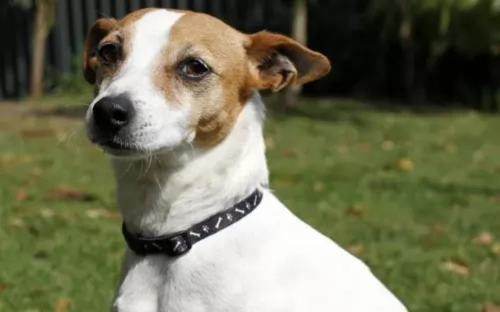 The ancestors of the Tenterfield Terrier came to Australia with the British and from them came this Australian breed. The English terriers were bred to be ratters on the ships to Australia. Today’s breed is a hardy, strong, athletic and agile dog. These first dogs were miniature Fox Terriers, bred for ratting. The miniature Fox Terrier was an established breed in the late 19th century in Australia with families and was know as a Mini Foxie. The breed became a steady presence in homes by the 1920’s.
The ancestors of the Tenterfield Terrier came to Australia with the British and from them came this Australian breed. The English terriers were bred to be ratters on the ships to Australia. Today’s breed is a hardy, strong, athletic and agile dog. These first dogs were miniature Fox Terriers, bred for ratting. The miniature Fox Terrier was an established breed in the late 19th century in Australia with families and was know as a Mini Foxie. The breed became a steady presence in homes by the 1920’s.
The breed might not have been named after the area of Tenterfield as many have guessed. Instead they may have been named after a breeder. The owner of the Tenterfield saddlery was called Tenterfield Saddler and he owned several of the breed. In 1990, Don Burke, a television personality suggested the breed be named the Tenterfield Terrier.
The Miniature Fox Terrier Club of South Australia. Now there were several clubs in Australia and a lot of disagreement about exactly what type of dog a miniature fox terrier was. Some did not think the name was legitimate, but they wanted recognition from the Australian National Kennel Club (ANKC). So, they became the Tenterfield Terrier Club of Australia in 1993. They were recognized by 2002.
Today the breed standard for the Tenterfield Terrier is different from the one for the Miniature Fox Terrier. They are now entirely separate breeds. In addition to the ANKC, the breed is recognized by the New Zealand Kennel Club but not by the AKC. It is also recognized by the American Pet Registry, Inc, the American Canine Registry and the Dog Registry of America, Inc.
 The Black Norwegian Elkhound is a short compact Spitz with dark eyes and a curly tail. It is the coat that sets this dog apart. It is an all-weather coat suitable for the cold, the snow and the rain of Norway. Ears are pointed and erect while the head is wedged and broad. His head is almost like that of a wolf. Its body is strong and compact. Its coat is coarse, short and double. He has a broad black nose with a straight bridge and with black lips and dark brown oval eyes. His legs and withers are strong boned and powerful with well padded feet to protect it from the freezing temperatures of Scandinavia.
The Black Norwegian Elkhound is a short compact Spitz with dark eyes and a curly tail. It is the coat that sets this dog apart. It is an all-weather coat suitable for the cold, the snow and the rain of Norway. Ears are pointed and erect while the head is wedged and broad. His head is almost like that of a wolf. Its body is strong and compact. Its coat is coarse, short and double. He has a broad black nose with a straight bridge and with black lips and dark brown oval eyes. His legs and withers are strong boned and powerful with well padded feet to protect it from the freezing temperatures of Scandinavia.
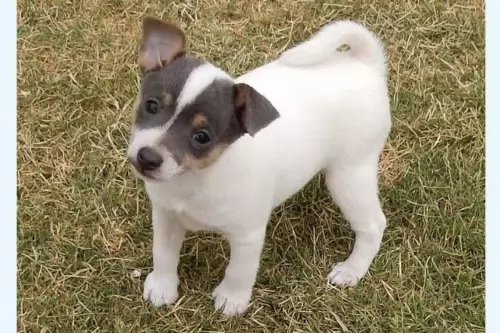 The Tenterfield Terrier is square and compact. He has a head shaped like a wedge and unusual in the terrier group. They have pricked ears and are predominantly white mixed with tan or black. They could also be tri-colored in black/tan and white or tan/liver and white. They have naturally occurring bob tails or docked tails. The nose is usually black unless the dog is liver colored, they have liver noses. The jaws are strong, and lips are tight with a strong neck.
The Tenterfield Terrier is square and compact. He has a head shaped like a wedge and unusual in the terrier group. They have pricked ears and are predominantly white mixed with tan or black. They could also be tri-colored in black/tan and white or tan/liver and white. They have naturally occurring bob tails or docked tails. The nose is usually black unless the dog is liver colored, they have liver noses. The jaws are strong, and lips are tight with a strong neck.
 This dog was made for families. He loves children and is not a one person dogs. He gets attached to everyone in the family. However, he is smart and stubborn. He loves to join in with whatever the family is doing but he does it to please himself not his owner. He loves, loves, loves to play and has the stamina to do so all day long. He is agile, bold, independent, strong, curious and loyal. His loyalty can be territorial, and he can become protective of his home and his family. This makes him an excellent watchdog until your friends come to visit and he won’t let them in the house. You need a high fence to keep him safe in your own yard and away from strangers and even guests till he gets to know them.He tends to be dominant and aggressive with other dogs. They also have strong hunting instincts.
This dog was made for families. He loves children and is not a one person dogs. He gets attached to everyone in the family. However, he is smart and stubborn. He loves to join in with whatever the family is doing but he does it to please himself not his owner. He loves, loves, loves to play and has the stamina to do so all day long. He is agile, bold, independent, strong, curious and loyal. His loyalty can be territorial, and he can become protective of his home and his family. This makes him an excellent watchdog until your friends come to visit and he won’t let them in the house. You need a high fence to keep him safe in your own yard and away from strangers and even guests till he gets to know them.He tends to be dominant and aggressive with other dogs. They also have strong hunting instincts.
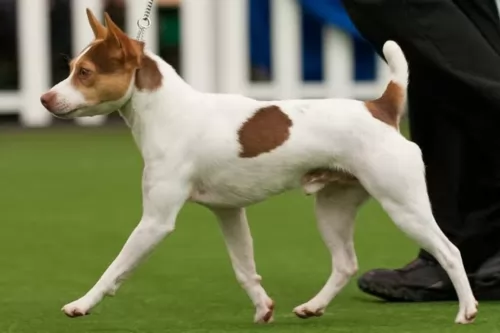 3.Adaptability – they need space even though they are small. They need a lot of exercise. They can adapt if they get another exercise. They can live in apartments and can play indoors as well as out.
3.Adaptability – they need space even though they are small. They need a lot of exercise. They can adapt if they get another exercise. They can live in apartments and can play indoors as well as out.
4.Learning ability – They are extremely intelligent, but they can be stubborn like all terriers.
 The Black Norwegian Elkhound is a strong and hardy dog, though he is susceptible to some of the problems many breeds face. These include issues with luxating patella, optical entropion, hip dysplasia, hypothyroidism, and Fanconi syndrome. The most serious of these is the Fanconi Syndrome which is an abnormal functioning in the tubules of the kidneys. This can be a life-threatening situation.
The Black Norwegian Elkhound is a strong and hardy dog, though he is susceptible to some of the problems many breeds face. These include issues with luxating patella, optical entropion, hip dysplasia, hypothyroidism, and Fanconi syndrome. The most serious of these is the Fanconi Syndrome which is an abnormal functioning in the tubules of the kidneys. This can be a life-threatening situation.
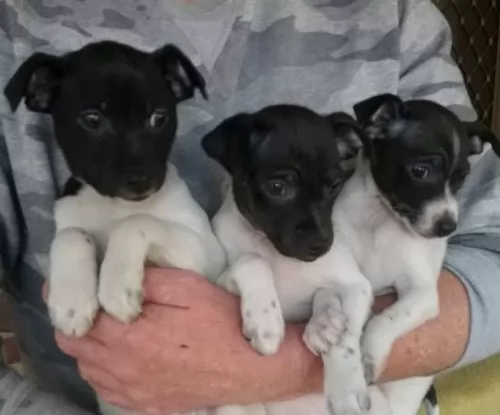 They are small in stature and because of their face they seem to have dental issues. The breed does not have a lot of health issues but deals with the same issues as many small terriers. Not all members of the breed are susceptible to these, but some are just like the Australian Terrier.
They are small in stature and because of their face they seem to have dental issues. The breed does not have a lot of health issues but deals with the same issues as many small terriers. Not all members of the breed are susceptible to these, but some are just like the Australian Terrier.
 This is an energetic active dog, or she should be. Feed her high nutritious food twice a day. Do not overfeed.
This is an energetic active dog, or she should be. Feed her high nutritious food twice a day. Do not overfeed.
The most potentially troublesome health issue is Fanconi Syndrome. This kidney disorder can impact the of the body’s absorption of electrolytes, water and nutrients. These nutrients include Sodium, Potassium, Glucose, Phosphate, Amino Acids and Phosphate
The Black Norwegian Elkhound loves to play, and they love to work. Exercise is vital, but it must be one of those two things – play or work. Don’t leave him alone to figure it out for himself or you wont like what this intelligent dog decides to do. She needs a large yard, a long walk daily but jogging with you is even better. Make him heel when on leash or he will think he oversees you. These are roaming dogs who will follow a scent anywhere and ignore your commands for her to come to you. They are better off on a leash unless you are in a dog park or a fenced yard.
The Black Norwegian Elkhound is great at all dog athletics, games and sports such as agility, rally obedience, flyball, tracking, herding.
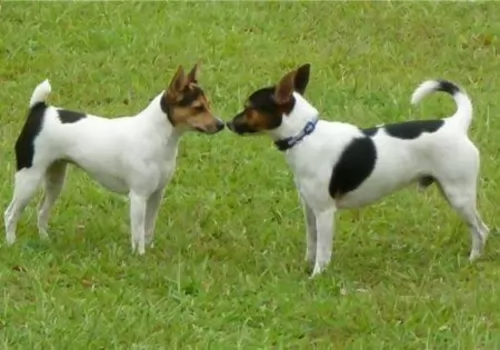 1.Feeding the puppy – Don’t overfeed but do feed high quality puppy food for small breeds and terriers.
1.Feeding the puppy – Don’t overfeed but do feed high quality puppy food for small breeds and terriers.
2.Feeding the adult – This is an active breed but don’t overfeed. Feed a high quality adult dog food for terriers or small breeds. Feed 2 times a day.
4. Games and Exercises – The breed has a high energy level and needs a lot of exercise. He is a terrier and loves to “go to ground”. Play activities that allow him to do that are best. He plays barn hunt, lure coursing and terrier specific competitions.